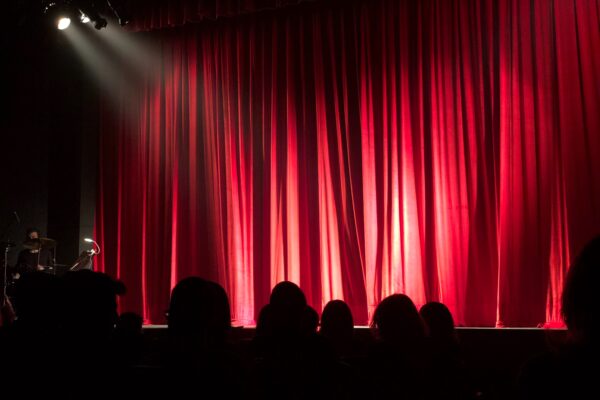Review: As You Like It? I loved it

You may remember the deaf actress Rose Ayling-Ellis winning the Strictly Come Dancing Glitterball in 2021 with her partner Giovanni Pernice. Did you know that she recently made her debut in West End theatre?
I was delighted to get tickets to see her playing Celia in As You Like It, Josie Rourke’s interpretation of Shakespeare’s gender swapping romance at the Soho Place Theatre, London. It was a purpose-built theatre with a 360-degree stage and captioning screens on all four sides. All performances were captioned and some were audio-described.
Rose, as Celia, used British Sign Language for the entire performance with her cousin and best friend, Rosalind, which had the effect of creating intimacy and empathy. As a result, the hearing audience had to read the captions in order to fully understand the dialogue, often in riddles. Rose’s signing and body language was so expressive that the meaning was clear irrespective of the captions.
Early in the performance I saw, however, one man stood up and ranted directly at Rose, accusing the actors of ‘discriminating against hearing people’. Following a break to remove the heckler, the play resumed to exuberant applause and the fool Touchstone’s appropriate line: “The more pity that fools may not speak wisely what wise men do foolishly.”
In Rose’s subsequent media post, she expressed her shock at the incident. It underlines the ongoing need to raise awareness of hearing loss and how it affects lives.
The play, which closed at the end of January (2023), deserved its four-star reviews which described Rose’s performance as ‘captivating’ and ‘a revelation bringing an adolescent charm to the role’, her movements displaying a ‘dancer’s sensibility’ and a range of emotions from ‘stompy anger’ to refined charm.
Rose has already touched our hearts and done much to change entrenched perceptions surrounding hearing loss. Now with a blossoming dramatic career, she will doubtless continue to make her mark on improving accessibility for all those with hearing loss and providing a role model for young people.
Captioned Performances
Before suffering Sudden Sensorineural Hearing Loss (SSHL), 10 years ago, I was a keen theatregoer. From then on, I closed the door on that pleasurable aspect of my life, as it simply did not occur to me that theatre productions might still be accessible to me.
One of the many benefits of attending a lipreading class is information sharing regarding various aspects of coping with life with hearing loss. Through my class, I discovered Stagetext, a deaf-led charity passionate about making culture accessible to all. The organisation, founded in 2000, captions over 300 theatre productions each year.
I eagerly scanned the listings, which include live and online theatre and talks. Having signed up for their email newsletter, I could keep up to date with which productions are captioned and promptly apply for tickets, to make sure I didn’t miss out.
Suddenly my life took an upturn. I was overjoyed to be back in a theatre seat, soaking up the atmosphere in the auditorium, engaging with the plot and feeling at ease in a hearing world. I realised how much I had missed it and have not looked back since.
To purchase tickets, you can either phone or email the box office using the access email address provided and pay once your tickets have been reserved. Theatregoers with hearing loss are entitled to two tickets at the access ticket price, up to half the normal ticket price, an added enticement if you need one.
In my experience, the box office staff are only too happy to advise on seating and pricing. This is important to make sure you sit where is there is a clear view of the stage and captions. Ask the member of staff to tell you the best seats available in each price band.
Some performances are also audio-described or BSL interpreted. Depending on the theatre, you might need to fill in an ‘Access Form’ so that you have a reference number and be advised of forthcoming shows.
Stagetext captioning is not the only means of viewing theatre productions with hearing loss. Some theatres have their own in-house captioning or other options. In addition to captioning, the National Theatre has hearing enhancement headsets available, a hearing loop system in its Olivier and Lyttelton Theatres and smart caption glasses for some shows, which display a transcript of the dialogue.
Technology is advancing. The greater the demand for access tickets, the more shows will be captioned.
Make 2023 the year to start or get back to theatregoing. Like me, you will find it reaps benefits far beyond the pleasure of the performance itself.